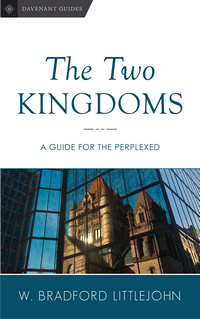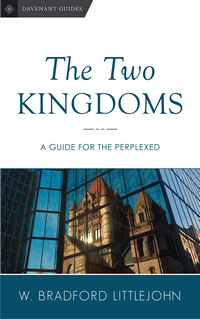 The Two Kingdoms:
The Two Kingdoms:
A Guide for
the Perplexed
DETAILS: Series: Davenant Guides Publisher: Davenant Press Publication Date: April 11, 2017 Format: eBook Length: 120 pg. Read Date: TEXT

We are simul justus et peccator, at the same time free lords and dutiful servants, at the same time alive with Christ in the heavenly places and toiling in murky paths here below, and even as we enjoy the liberty of a conscience set free by grace, we live under the laws (natural and civil) that regulate our lives with one another as human creatures. To confuse these two rules is to risk libertinism or legalism, triumphalism or despair.
What’s The Two Kingdoms About?
The Publisher describes it better than I could:
What does it mean to say Christ reigns in two kingdoms?
What does it mean to live as citizens of this world and of the world-to-come? How can we render to Caesar the things that are Caesar’s and to God the things that are God’s? In recent years, fresh controversy has erupted over these age-old questions, and especially over the meaning and relevance of the Reformation’s “two-kingdoms” doctrine. At stake in such debates is not simply the shape of Christian politics, but the meaning of the church, the nature of human and divine authority, and the scope of Christian discipleship.
In this concise guide, Reformation scholar and Christian ethicist Bradford Littlejohn first sketches the history of the doctrine and clears away common misunderstandings. He then shows that the two-kingdoms doctrine can offer a valuable framework for thinking about pastoring, politics, and even financial stewardship.
Littlejohn gives us three chapters tracing the development of the concept starting with Luther and going through the early seventeenth century, looking at the “implications for political theology, ecclesiology, and Christian life.”
Then he offers “a creative appropriation of the doctrine today in the three key spheres of church, state, and marketplace, suggesting how it can shed fresh light on seemingly sterile disputes over how to live out the lordship of Christ in the 21st century.”
Throughout this, he will draw distinctions from his view of the Two Kingdoms to the “R2K” views (defined as “radical Two Kingdoms” or “Reformed Two Kingdoms”, depending who you ask) as well as a neo-Calvinist view, a Theonomistic view, or some others.
A Positive and A Negative
This is an introductory volume—and one that is only 120 pages long. So we’re only going to get a cursory look at all these ideas, ideas that are inherently complex just from a positive point of view—as he also offers critiques as well, that really doesn’t give Littlejohn a lot of time for explanation or depth.
This is a strength because he gives you a quick lay of the land, a look at Two Kingdom theology from 10,000 feet.
But it’s a weakness because that’s all we get—there aren’t even a plethora of footnotes. So we get assertion after assertion—but not a lot of reason to do more than take his word for it. It’s hard to swallow when he says something along the lines of, “I’m right about what Calvin said, unlike this other guy.” I don’t think he slips into the fallacy of ipse dixit, but he can see it from his front porch.
So, what did I think about The Two Kingdoms?
The two- kingdoms doctrine was a rebuke to our eagerness to call Christ down from heaven, seeing his hand in our own works and hearing his voice in our own words. It was an eschatological reminder that we live in a time between the times of Christ’s coming, that regardless of our duty to witness to the reign of the Son of Man, that reign remains hidden behind the “masks” that God has ordained to do his will in history.
I have, honestly, stayed as far away as I could from the topics of Christianity and politics/political theory/etc. for several years now. And really have only looked at it a little now because of some prodding by others, most of whom strongly recommended this book and cite it often.
Despite my misgivings (see above) about Littlejohn not really proving his assertions, I did find this helpful for giving a lay of the land, for drawing lines between his view and the R2K proponents (and I’ll give him the benefit of the doubt and agree he’s closer to the first few generations of Protestants than the R2Kers are).
I found a lot of wisdom in the chapters about the State and Market, and found the chapter “Two Kingdoms in The Church” to be provocative.
As with any good introduction, I was left with more questions than answers—but I think I know the directions to look for some of those answers. I do wish the book was 80 pages or so longer—it still would’ve been able to stick to its foundational nature but it could’ve put a little meat the bones to help with some of those details.
I recommend this with some caveats, just know that when you’re only getting the beginning of an idea about the Two Kingdoms.

This post contains an affiliate link. If you purchase from it, I will get a small commission at no additional cost to you. As always, the opinions expressed are my own.
![]()



